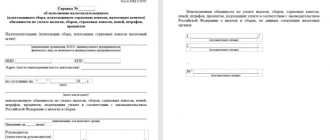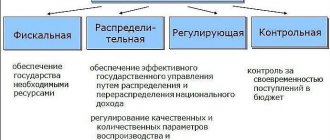What are the principles of tax law?
The principles of tax law and the principles of taxation are questions of the theory of the science of tax law.
The former are defined as the main initial provisions of this legal branch, its basic ideas, the latter - as the fundamental, basic provisions underlying the tax system of the state. From a practical point of view, the general principles of taxation refer to the basic guarantees, the establishment of which by federal law ensures the implementation and observance of the foundations of the constitutional system, fundamental rights and freedoms of man and citizen, and the principles of federalism in the Russian Federation (Resolution of the Constitutional Court of the Russian Federation of March 21, 1997 No. 5-P).
Read about what the management of the state tax system is based on in the article “What does tax administration include?”
Principles of taxation in the Russian Federation
The principles of taxation in the Russian Federation are established in Art. 3 NKRF. So, the law enshrines the following basic principles of legislation on taxes and fees: 1) legality. No one can be assigned the obligation to pay taxes and fees, as well as other contributions and payments that have the characteristics of taxes or fees established by the Tax Code of the Russian Federation, are not provided for by the Tax Code of the Russian Federation or are established in a manner other than that determined by the Tax Code of the Russian Federation; 2) the principle of certainty, clarity and unambiguity of the legal norm. The general legal criterion for this provision follows from the constitutional principle of equality of all before the law and the court (Part 1 of Article 19 of the Constitution of the Russian Federation), since such equality can be ensured only subject to a uniform understanding and interpretation of the norm by all law enforcement officials. The uncertainty of the content of a legal norm, on the contrary, allows for the possibility of unlimited discretion in the process of law enforcement and inevitably leads to arbitrariness, and therefore to a violation of the principles of equality, as well as the rule of law; 3) the principle of mandatory payment of taxes and fees. In accordance with this principle, every person must pay legally established taxes and fees. Legislation on taxes and fees is based on the recognition of the universality and equality of taxation. When establishing taxes, the actual ability of the taxpayer to pay the tax is taken into account; 4) the principle of the non-discriminatory nature of taxes and fees - taxes and fees cannot be applied differently based on social, racial, national, religious and other similar criteria. It is not allowed to establish differentiated rates of taxes and fees, tax benefits depending on the form of ownership, citizenship of individuals or place of origin of capital; 5) the principle of economic feasibility. Taxes and fees must have an economic basis and cannot be arbitrary. Taxes and fees that prevent citizens from exercising their constitutional rights are unacceptable. It is not allowed to establish taxes and fees that violate the single economic space of the Russian Federation; 6) the principle of establishing all elements of taxation. When establishing taxes, all elements of taxation must be determined. Acts of legislation on taxes and fees must be formulated in such a way that everyone knows exactly what taxes (fees), when and in what order he must pay; 7) ensuring a single economic space of the Russian Federation. The constitutional principle of the unity of economic space, free movement of goods, services and financial resources, support of competition, freedom of economic activity is established by Part 1 of Art. 8 of the Constitution of the Russian Federation. Thus, the establishment of taxes that impede the development of a single economic space, by, for example, limiting the volume of goods moved from one subject of the Federation to another or levying taxes from taxpayers in other regions, is illegal; all irremovable doubts, contradictions and ambiguities in acts of legislation on taxes and fees are interpreted in favor of the taxpayer (payer of fees). In this regard, when considering tax disputes based on different interpretations of the legislation on taxes and fees by tax authorities and taxpayers, courts need to assess the certainty of the relevant norm.
5. Types of taxes and methods of their classification In educational and scientific literature, there are several classifications of taxes and fees. The most successful classification was proposed by the teaching staff of the Department of Financial Law of the Russian Academy of the Ministry of Justice of the Russian Federation (Krokhina Yu. A., Smirnova Yu. L.)2. They propose a classification on the following grounds. 1. Depending on the payer: a) taxes on organizations - mandatory payments collected only from taxpayers - organizations (VAT, NP, etc.). It must be remembered that the subjects of tax law are organizations, not legal entities, although in most cases organizations have the status of a legal entity; b) taxes on individuals - mandatory payments levied on individual taxpayers - individuals (personal income tax, personal property tax, etc.); c) general taxes for individuals and organizations - mandatory payments paid by all categories of taxpayers, regardless of their organizational and legal status. The presence of general taxes is due to the fact that the main principle of their collection is the presence of any object, the presence of any object in the ownership of a person (for example, land tax). 2. Depending on the form of taxation: a) direct (income and property) - taxes levied in the process of acquiring material goods, determined by the size of the object of taxation and paid by the manufacturer or owner (income tax, etc.). Direct taxes are divided into: – personal – taxes paid by the taxpayer at the expense of and depending on the income (profit) received and taking into account the financial viability of the payer (for example, personal income tax, NP (organizational income); – real – taxes paid on property, based which lies not real, but estimated average income, the receipt of which is only expected (for example, a single tax on imputed income, a tax on gambling business, a land tax). b) indirect (on consumption) - taxes levied in the process of spending material goods, determined by the amount consumption, included in the form of a premium to the price of the product and paid by the consumer (excise taxes, VAT, etc.). In case of indirect taxation, the formal payer is the seller of goods (works, services), who is, as it were, an intermediary between the state treasury and the consumer of the goods (works, services). The real tax payer is the consumer. It is the criterion of the relationship between the legal and the actual payer that is one of the main ones when distinguishing between direct and indirect taxes. 3. At the territorial level: a) federal taxes - established and put into effect by the federal body of representative power - the State Duma of the Russian Federation. The list of federal taxes and their rates are uniform throughout the Russian Federation and cannot be changed by state authorities of the constituent entities of the Russian Federation or local governments; b) taxes of the constituent entities of the Russian Federation - taxes listed in the Tax Code of the Russian Federation, but put into effect by the representative (legislative) bodies of state power of the constituent entities of the Russian Federation and mandatory for payment only on the territory of the corresponding constituent entity of the Russian Federation (for example, property tax of organizations, transport tax, gambling tax business); c) local taxes - taxes established by the Tax Code of the Russian Federation, but put into effect by representative bodies of local self-government and mandatory for payment in the territory of the corresponding municipality (for example, land tax, property tax for individuals). 4. Depending on the revenue channel: a) state taxes, fully credited to state budgets; b) local - taxes that are fully credited to municipal budgets; c) proportional - taxes distributed between budgets of various levels according to certain quotas; d) off-budget - taxes going to certain off-budget funds. 5. Depending on the nature of use: a) taxes of general significance - used for general purposes, without specifying the activities or costs on which they are spent. These are the majority of taxes levied in the Russian Federation; b) targeted taxes - credited to targeted extra-budgetary funds or allocated as a separate line in the budget and intended to finance specific activities (for example, land tax). 6. Depending on the frequency of collection: a) one-time – taxes paid once during a certain period when performing specific actions (for example, UTII); b) regular taxes - levied systematically, at certain intervals and throughout the entire period of ownership or activity of the payer (personal income tax, corporate property tax, etc.). The listed criteria for tax classification are not exhaustive, but at the same time they are sufficient for the legal characterization of all taxes and fees currently in force in the Russian Federation. In scientific and educational literature, taxes are grouped in other ways, which makes it possible to more accurately identify the essence of each obligatory payment collected without fail.
The principles of taxation in the Russian Federation are established in Art. 3 NKRF. So, the law enshrines the following basic principles of legislation on taxes and fees: 1) legality. No one can be assigned the obligation to pay taxes and fees, as well as other contributions and payments that have the characteristics of taxes or fees established by the Tax Code of the Russian Federation, are not provided for by the Tax Code of the Russian Federation or are established in a manner other than that determined by the Tax Code of the Russian Federation; 2) the principle of certainty, clarity and unambiguity of the legal norm. The general legal criterion for this provision follows from the constitutional principle of equality of all before the law and the court (Part 1 of Article 19 of the Constitution of the Russian Federation), since such equality can be ensured only subject to a uniform understanding and interpretation of the norm by all law enforcement officials. The uncertainty of the content of a legal norm, on the contrary, allows for the possibility of unlimited discretion in the process of law enforcement and inevitably leads to arbitrariness, and therefore to a violation of the principles of equality, as well as the rule of law; 3) the principle of mandatory payment of taxes and fees. In accordance with this principle, every person must pay legally established taxes and fees. Legislation on taxes and fees is based on the recognition of the universality and equality of taxation. When establishing taxes, the actual ability of the taxpayer to pay the tax is taken into account; 4) the principle of the non-discriminatory nature of taxes and fees - taxes and fees cannot be applied differently based on social, racial, national, religious and other similar criteria. It is not allowed to establish differentiated rates of taxes and fees, tax benefits depending on the form of ownership, citizenship of individuals or place of origin of capital; 5) the principle of economic feasibility. Taxes and fees must have an economic basis and cannot be arbitrary. Taxes and fees that prevent citizens from exercising their constitutional rights are unacceptable. It is not allowed to establish taxes and fees that violate the single economic space of the Russian Federation; 6) the principle of establishing all elements of taxation. When establishing taxes, all elements of taxation must be determined. Acts of legislation on taxes and fees must be formulated in such a way that everyone knows exactly what taxes (fees), when and in what order he must pay; 7) ensuring a single economic space of the Russian Federation. The constitutional principle of the unity of economic space, free movement of goods, services and financial resources, support of competition, freedom of economic activity is established by Part 1 of Art. 8 of the Constitution of the Russian Federation. Thus, the establishment of taxes that impede the development of a single economic space, by, for example, limiting the volume of goods moved from one subject of the Federation to another or levying taxes from taxpayers in other regions, is illegal; all irremovable doubts, contradictions and ambiguities in acts of legislation on taxes and fees are interpreted in favor of the taxpayer (payer of fees). In this regard, when considering tax disputes based on different interpretations of the legislation on taxes and fees by tax authorities and taxpayers, courts need to assess the certainty of the relevant norm.
5. Types of taxes and methods of their classification In educational and scientific literature, there are several classifications of taxes and fees. The most successful classification was proposed by the teaching staff of the Department of Financial Law of the Russian Academy of the Ministry of Justice of the Russian Federation (Krokhina Yu. A., Smirnova Yu. L.)2. They propose a classification on the following grounds. 1. Depending on the payer: a) taxes on organizations - mandatory payments collected only from taxpayers - organizations (VAT, NP, etc.). It must be remembered that the subjects of tax law are organizations, not legal entities, although in most cases organizations have the status of a legal entity; b) taxes on individuals - mandatory payments levied on individual taxpayers - individuals (personal income tax, personal property tax, etc.); c) general taxes for individuals and organizations - mandatory payments paid by all categories of taxpayers, regardless of their organizational and legal status. The presence of general taxes is due to the fact that the main principle of their collection is the presence of any object, the presence of any object in the ownership of a person (for example, land tax). 2. Depending on the form of taxation: a) direct (income and property) - taxes levied in the process of acquiring material goods, determined by the size of the object of taxation and paid by the manufacturer or owner (income tax, etc.). Direct taxes are divided into: – personal – taxes paid by the taxpayer at the expense of and depending on the income (profit) received and taking into account the financial viability of the payer (for example, personal income tax, NP (organizational income); – real – taxes paid on property, based which lies not real, but estimated average income, the receipt of which is only expected (for example, a single tax on imputed income, a tax on gambling business, a land tax). b) indirect (on consumption) - taxes levied in the process of spending material goods, determined by the amount consumption, included in the form of a premium to the price of the product and paid by the consumer (excise taxes, VAT, etc.). In case of indirect taxation, the formal payer is the seller of goods (works, services), who is, as it were, an intermediary between the state treasury and the consumer of the goods (works, services). The real tax payer is the consumer. It is the criterion of the relationship between the legal and the actual payer that is one of the main ones when distinguishing between direct and indirect taxes. 3. At the territorial level: a) federal taxes - established and put into effect by the federal body of representative power - the State Duma of the Russian Federation. The list of federal taxes and their rates are uniform throughout the Russian Federation and cannot be changed by state authorities of the constituent entities of the Russian Federation or local governments; b) taxes of the constituent entities of the Russian Federation - taxes listed in the Tax Code of the Russian Federation, but put into effect by the representative (legislative) bodies of state power of the constituent entities of the Russian Federation and mandatory for payment only on the territory of the corresponding constituent entity of the Russian Federation (for example, property tax of organizations, transport tax, gambling tax business); c) local taxes - taxes established by the Tax Code of the Russian Federation, but put into effect by representative bodies of local self-government and mandatory for payment in the territory of the corresponding municipality (for example, land tax, property tax for individuals). 4. Depending on the revenue channel: a) state taxes, fully credited to state budgets; b) local - taxes that are fully credited to municipal budgets; c) proportional - taxes distributed between budgets of various levels according to certain quotas; d) off-budget - taxes going to certain off-budget funds. 5. Depending on the nature of use: a) taxes of general significance - used for general purposes, without specifying the activities or costs on which they are spent. These are the majority of taxes levied in the Russian Federation; b) targeted taxes - credited to targeted extra-budgetary funds or allocated as a separate line in the budget and intended to finance specific activities (for example, land tax). 6. Depending on the frequency of collection: a) one-time – taxes paid once during a certain period when performing specific actions (for example, UTII); b) regular taxes - levied systematically, at certain intervals and throughout the entire period of ownership or activity of the payer (personal income tax, corporate property tax, etc.). The listed criteria for tax classification are not exhaustive, but at the same time they are sufficient for the legal characterization of all taxes and fees currently in force in the Russian Federation. In scientific and educational literature, taxes are grouped in other ways, which makes it possible to more accurately identify the essence of each obligatory payment collected without fail.
What principles of taxation are enshrined in the Tax Code of the Russian Federation?
The principles of taxation are discussed in Art. 3 Tax Code of the Russian Federation. She calls them the basic principles of legislation on taxes, fees and insurance premiums. They are as follows:
- The principle of legality of taxation (clauses 1 and 5 of Article 3 of the Tax Code of the Russian Federation) means that we pay only those tax payments that are established by the Tax Code. If a payment has the characteristics of a tax, but is not provided for in the code, or if the procedure for establishing it is violated, its collection is illegal.
- The principle of universality and equality of taxation (Clause 2 of Article 3 of the Tax Code of the Russian Federation) comes down to the non-admission of any discrimination, including on social, racial, national, religious and other similar criteria, as well as depending on the form of ownership, citizenship of individuals or place of origin capital.
- The principle of proportionality of taxation (clauses 1 and 3 of Article 3 of the Tax Code of the Russian Federation), first of all, requires taking into account the taxpayer’s ability to pay a tax (fee, contribution), in addition, it establishes the need for an economic basis for tax payments and the inadmissibility of their arbitrary establishment, as well as the prohibition to establish taxes, fees and contributions that prevent citizens from exercising their constitutional rights.
- The principle of the unity of the tax system of the Russian Federation (clause 4 of Article 3 of the Tax Code of the Russian Federation): it is not allowed to establish taxes, fees and contributions that violate the single economic space of our country, in particular, directly or indirectly limiting the free movement of money or goods (work, services) across it ).
- The principle of certainty of taxation (clauses 6 and 7 of Article 3 of the Tax Code of the Russian Federation): when establishing tax payments, all elements of taxation must be determined. The tax law must be formulated in such a way that everyone knows exactly what taxes (fees, contributions), when and in what order he must pay. In this case, all irremovable doubts, contradictions and ambiguities must be interpreted in favor of the payer.
To learn how you can calculate the tax burden on a specific taxpayer, read the material “Calculation of the tax burden in 2022 - 2022 (formula).”
What does the principle of fairness mean in tax law? A ready-made solution from ConsultantPlus will answer this question. You can get trial access to the legal system for free by signing up for a trial access.
Article 3 (Tax Code of the Russian Federation) of the Tax Code of the Russian Federation. Basic principles of legislation on taxes and fees
1. Every person must pay legally established taxes and fees. Legislation on taxes and fees is based on the recognition of the universality and equality of taxation. When establishing taxes, the actual ability of the taxpayer to pay the tax is taken into account.
(as amended by Federal Law dated July 9, 1999 N 154-FZ)
2. Taxes and fees cannot be discriminatory and applied differently based on social, racial, national, religious and other similar criteria.
(as amended by Federal Law dated July 9, 1999 N 154-FZ)
It is not allowed to establish differentiated rates of taxes and fees, tax benefits depending on the form of ownership, citizenship of individuals or place of origin of capital.
The paragraph is no longer valid. — Federal Law of July 29, 2004 N 95-FZ.
3. Taxes and fees must have an economic basis and cannot be arbitrary. Taxes and fees that prevent citizens from exercising their constitutional rights are unacceptable.
4. It is not allowed to establish taxes and fees that violate the single economic space of the Russian Federation and, in particular, directly or indirectly limit the free movement of goods (work, services) or financial assets within the territory of the Russian Federation, or otherwise limit or create obstacles not prohibited by law economic activities of individuals and organizations.
(as amended by Federal Law dated July 9, 1999 N 154-FZ)
5. The paragraph is no longer valid. — Federal Law of July 29, 2004 N 95-FZ.
The paragraph is no longer valid. — Federal Law of July 29, 2004 N 95-FZ.
No one can be obligated to pay taxes and fees, as well as other contributions and payments that have the characteristics of taxes or fees established by this Code, are not provided for by this Code or are established in a manner other than that determined by this Code.
6. When establishing taxes, all elements of taxation must be determined. Acts of legislation on taxes and fees must be formulated in such a way that everyone knows exactly what taxes (fees, insurance premiums), when and in what order he must pay.
(as amended by Federal Laws dated 07/09/1999 N 154-FZ, dated 07/03/2016 N 243-FZ)
7. All irremovable doubts, contradictions and ambiguities in acts of legislation on taxes and fees are interpreted in favor of the taxpayer (fee payer, insurance premium payer, tax agent).
(as amended by Federal Law dated July 3, 2016 N 243-FZ)
Previous article | Tax Code of the Russian Federation part 1 | Next article
Question 3. Principles of tax law (Article 3 of the Tax Code of the Russian Federation)
Legal significance: 1) the basis of law enforcement activities 2) taxes and fees must be established in accordance with the principles of tax law provided for by federal legislation.
Industry principles of tax law are both directly enshrined in specific norms of tax laws (norms-principles) and are derived from the meaning of these norms. We are talking about textual and semantic forms of expression of legal principles. These, in our opinion, include the following:
1. The principle of universality and equality of taxation and the prohibition of discrimination in tax legal relations.
Taxes and fees cannot be discriminatory and applied differently based on social, racial, national, religious and other similar criteria.
2. The principle of fair, proportionate taxation
means 1) each tax must have an economic basis (property, income, etc.); 2) the tax cannot be arbitrary, it must take into account the actual solvency of the taxpayer
3.The principle of unity of the tax system
, i.e. taxes and fees should not violate the unity of the economic space of the Russian Federation, limit the free movement of goods and financial resources within the Russian Federation, or otherwise limit the economic activities of taxpayers.
4. The principle of prohibition of establishing taxes and fees that prevent citizens from exercising their constitutional rights
.
5. The principle of certainty of tax liability.
When establishing taxes, all elements of taxation must be determined (Article 17 of the Tax Code). Acts of legislation on taxes and fees must be formulated in such a way that everyone knows exactly what taxes (fees), when and in what order he must pay.
6. The principle of one-time taxation
. This principle has only semantic consolidation (Article 38 of the Tax Code) and means the prohibition of taxation of the same object for the same tax period with a tax of the same type (type).
7. The principle of self-payment of tax.
This principle also has only semantic consolidation; its continuation is the catchphrase “taxes are not negotiated” (the prohibition of “tax clauses” in contracts).
Legal significance: 1) the basis of law enforcement activities 2) taxes and fees must be established in accordance with the principles of tax law provided for by federal legislation.
Industry principles of tax law are both directly enshrined in specific norms of tax laws (norms-principles) and are derived from the meaning of these norms. We are talking about textual and semantic forms of expression of legal principles. These, in our opinion, include the following:
1. The principle of universality and equality of taxation and the prohibition of discrimination in tax legal relations.
Taxes and fees cannot be discriminatory and applied differently based on social, racial, national, religious and other similar criteria.
2. The principle of fair, proportionate taxation
means 1) each tax must have an economic basis (property, income, etc.); 2) the tax cannot be arbitrary, it must take into account the actual solvency of the taxpayer
3.The principle of unity of the tax system
, i.e. taxes and fees should not violate the unity of the economic space of the Russian Federation, limit the free movement of goods and financial resources within the Russian Federation, or otherwise limit the economic activities of taxpayers.
4. The principle of prohibition of establishing taxes and fees that prevent citizens from exercising their constitutional rights
.
5. The principle of certainty of tax liability.
When establishing taxes, all elements of taxation must be determined (Article 17 of the Tax Code). Acts of legislation on taxes and fees must be formulated in such a way that everyone knows exactly what taxes (fees), when and in what order he must pay.
6. The principle of one-time taxation
. This principle has only semantic consolidation (Article 38 of the Tax Code) and means the prohibition of taxation of the same object for the same tax period with a tax of the same type (type).
7. The principle of self-payment of tax.
This principle also has only semantic consolidation; its continuation is the catchphrase “taxes are not negotiated” (the prohibition of “tax clauses” in contracts).




